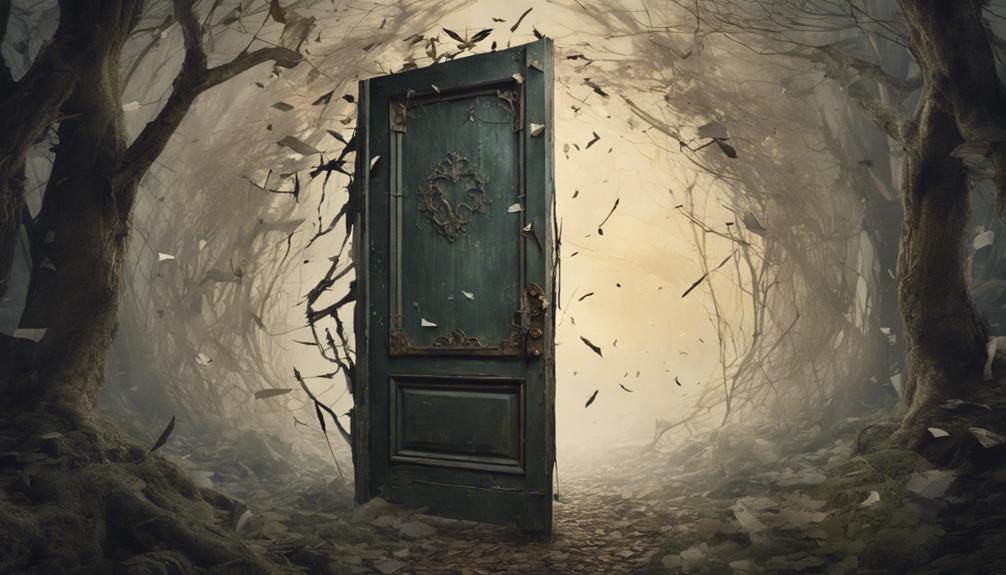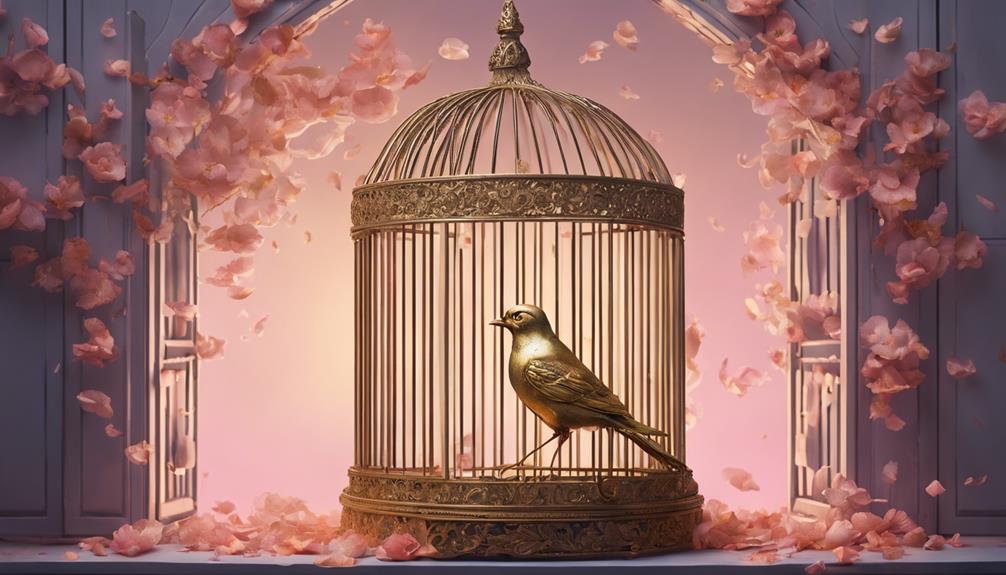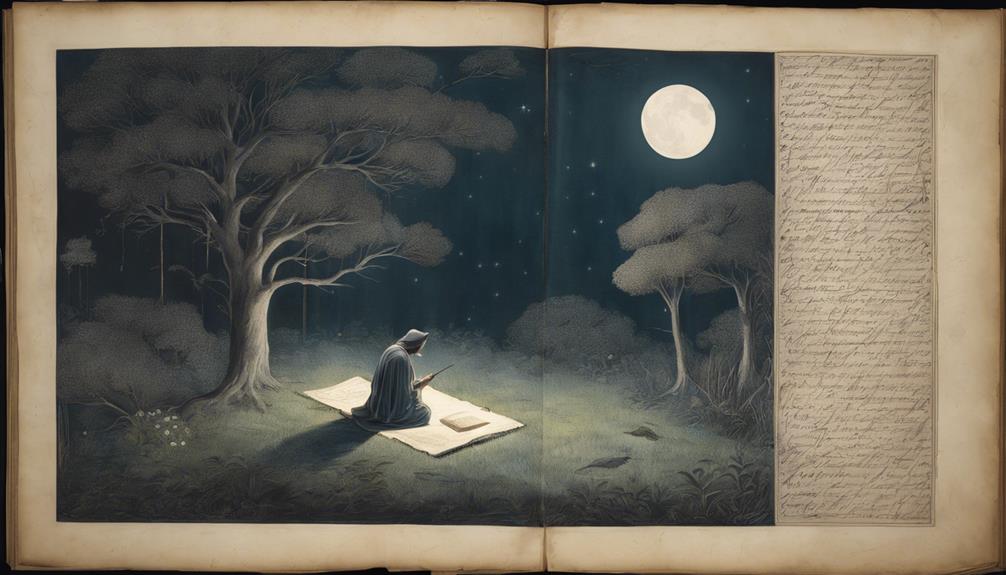As you examine Thomas Wyatt's sonnet "They Flee From Me," you'll uncover a rich tapestry of emotions, where the speaker's lamentation of lost love and longing serves as a poignant reminder of the ephemeral nature of desire. The poem masterfully weaves together themes of courtly love, societal pressures, and the push-and-pull of relationships. Through Wyatt's deft use of metaphors and symbolism, you'll gain insight into the complexities of the human experience. The speaker's anguish and frustration with suffocating expectations will resonate deeply. As you continue, the nuances of the poem will reveal themselves, shedding light on the timeless relevance of this sonnet.
Unraveling the Poem's Central Theme

As you explore the poem 'They Flee From Me,' it becomes increasingly evident that the speaker's lamentation of lost love and longing serves as a mere facade for a profound exploration of the human psyche's most intrinsic fears and desires. Beneath the surface of romantic despair lies a complex web of psychological insights, subtly woven into the fabric of the poem. The speaker's emotional intimacy, initially presented as a longing for a past love, gradually reveals itself to be a yearning for a deeper connection – one that transcends the boundaries of romantic love. This desire for emotional intimacy, however, is stifled by the rigid social constraints of the time, which imposed strict norms on relationships. The speaker's frustration is palpable as they struggle to reconcile their desire for authenticity with the suffocating expectations of their social circle. Through this tension, the poem masterfully exposes the darker aspects of human nature, laying bare the anxieties and desires that underpin our most intimate relationships.
Historical Context of Courtly Love

In the medieval landscape of chivalric romances and aristocratic courts, the ideology of courtly love emerged as a complex, often paradoxical, construct that simultaneously exalted and constrained the expression of romantic desire. As you explore the world of medieval literature, you'll notice that courtly love was deeply intertwined with the chivalric code, which emphasized honor, loyalty, and bravery. This code, upheld by knights and nobles, also influenced the way romantic relationships were perceived and pursued. Within aristocratic courts, courtly love became a refined and cultivated ideal, where love was seen as a noble and ennobling pursuit. You'll find that this cultural context had a profound impact on the way poets and writers of the time approached themes of love, desire, and relationships. As you analyze the poem 'They Flee From Me,' understanding the historical context of courtly love will help you appreciate the nuances of the speaker's emotions and the societal pressures that shaped their experiences.
The Speaker's Lament of Lost Love

During the fleeting moments of intimacy, you're struck by the speaker's anguished cry of lost love, as the memories of past encounters now taunt them with the cruel realization that those who once lavished them with affection have since fled. This poignant expression is a confirmation of the speaker's profound sense of love's disillusionment. The romantic nostalgia that permeates the poem is a bittersweet reminder of the transience of human connection.
As you explore deeper into the speaker's psyche, you're confronted with the painful awareness that love can be a fleeting, ephemeral experience. The speaker's anguish is palpable, a heartfelt expression of the despair that accompanies the loss of love. The poem's nostalgic tone is a stark reminder that love can swiftly turn to disillusionment, leaving behind only the bitter taste of longing.
In this poignant exploration of lost love, the speaker's lament serves as a powerful condemnation of the fragility of human relationships. The poem's nuanced exploration of love's disillusionment is a sobering reminder that even the most ardent of passions can ultimately prove ephemeral.
Metaphors of Captivity and Freedom

Upon closer examination, you'll find that the speaker's language is permeated with metaphors of captivity and freedom, which astutely convey the complex power dynamics underlying the speaker's tumultuous relationships. These metaphors serve as a window into the speaker's psyche, revealing the intricate web of emotions and desires that govern their interactions.
The image of "Freedom's chains" is particularly striking, as it suggests that even in moments of liberation, the speaker feels entrapped by their own desires. This paradox is further underscored by the notion of "Prisoned hearts," implying that even in the midst of romantic freedom, the speaker's heart remains captive to their own emotions.
Through these metaphors, the speaker masterfully conveys the push-and-pull of their relationships, where freedom and captivity are inextricably intertwined. By examining these metaphors, you'll gain a deeper understanding of the speaker's inner turmoil and the ways in which they navigate the complexities of love and desire.
The Societal Pressures of Romance

One of the most profound influences shaping the speaker's romantic relationships is the suffocating weight of societal expectations, which can leave you feeling like a pawn in a game of emotional chess. You're often pressured to conform to romantic expectations, forcing you to navigate a complex web of unreal relationships. These expectations can be overwhelming, making it difficult to distinguish between genuine emotions and those manufactured to meet societal standards.
The speaker's struggles with romantic relationships are, in part, a result of these pressures. You're led to believe that romantic love should be a certain way, and when reality doesn't meet these expectations, it can be disillusioning. The poem suggests that these societal pressures can lead to a sense of disconnection and fragmentation, as individuals struggle to reconcile their true feelings with the ideals imposed upon them. Ultimately, the poem highlights the tension between the romantic expectations foisted upon us and the often-unreal relationships that result from trying to meet them.
Wyatt's Use of Symbolism Unveiled

As you navigate the complexities of the poem, it becomes clear that Wyatt's strategic use of symbolism is a deliberate attempt to mirror the speaker's fractured sense of self, underscoring the tension between societal expectations and personal emotions. The Symbolic Hunters, representing the external forces that dictate the speaker's actions, are pitted against the Poetic Prey, embodying the speaker's inner desires and emotions. This dichotomy is exemplified in the image of the fleeing women, who symbolize the elusiveness of true connection in a society governed by courtly love. Wyatt's deployment of these symbols masterfully captures the speaker's conflicted psyche, torn between conforming to societal norms and embracing their genuine feelings. The Symbolic Hunters, with their connotations of pursuit and capture, also hint at the oppressive nature of societal expectations, which can suffocate individuality. By employing these symbols, Wyatt crafts a nuanced exploration of the human experience, laying bare the struggle to reconcile external pressures with internal desires.
Language and Imagery in the Sonnet

In Wyatt's sonnet, the linguistic and imaginative landscape is characterized by a deliberate spareness, which serves to underscore the speaker's emotional restraint, while simultaneously conjuring a sense of intimacy that draws you, the reader, into the poet's inner world. This spareness is particularly evident in the sonnet's concise and simple sentence structures, which create a sense of quiet contemplation.
However, upon closer examination, you'll discover that Wyatt's language is rich in verbal irony, wherein the speaker's words often belie their true emotions. For instance, when the speaker says "they flee from me," the phrase takes on a tone of nonchalance, despite the underlying sense of longing and rejection. Additionally, Wyatt's use of sensory details, such as the "naked foot" and "gentle" touch, creates a vivid and tactile experience, drawing you further into the poem's emotional landscape. The combination of these linguistic and imaginative elements creates a complex, nuanced portrait of the speaker's emotional state, inviting you to explore the depths of their inner world.
The Fleeting Nature of Desire

Several fleeting moments of desire are captured in Wyatt's sonnet, where the speaker's longing for a romantic connection is tempered by the awareness that such desires are inherently ephemeral. As you explore the poem, you'll find that the speaker's yearning is underscored by a profound understanding that the fleeting beauty of their beloved will eventually fade. This tension between desire and disillusionment creates a sense of urgency, as if the speaker is desperate to grasp the unattainable dreams that tantalize them.
The poem's imagery reinforces this theme, with the speaker describing their beloved as 'wild' and 'unstable,' emphasizing the elusiveness of their desire. You may notice how Wyatt's use of metaphor and symbolism serves to underscore the transience of human connection, implying that even the most ardent passions are ultimately doomed to fade. As you reflect on the poem's themes, consider how Wyatt's exploration of the fleeting nature of desire speaks to the universal human experience of longing for something that may always remain just out of reach.
Timeless Relevance of the Poem

Wyatt's sonnet, with its poignant exploration of the fleeting nature of desire, continues to resonate with readers today, its themes and emotions speaking to a fundamental aspect of the human experience that transcends time and cultural boundaries. As you explore the poem's intricate web of emotions, you'll find that its timeless nostalgia taps into your own experiences of love, loss, and longing. The sonnet's enduring emotions evoke a deep sense of empathy, allowing you to reflect on your own relationships and the ephemeral nature of human connections.
The poem's universality lies in its ability to capture the bittersweet essence of desire, which remains an integral part of the human experience. Wyatt's masterful use of language and imagery creates a sense of intimacy, making you feel seen and understood. As you read through the lines, you'll find yourself nodding in recognition, acknowledging the pain and beauty of fleeting connections. The poem's timeless relevance is a testament to its ability to transcend time, speaking directly to your heart and evoking a profound sense of emotional resonance.
Frequently Asked Questions
What Inspired Thomas Wyatt to Write "They Flee From Me"?
What drives a poet to craft verses of heartache and longing? You're likely wondering what inspired Thomas Wyatt to write 'They Flee From Me'. As you explore the world of Tudor politics, you'll discover that Wyatt's poem was likely sparked by his tumultuous experiences within the royal courtships of King Henry VIII's reign. Amidst the intrigue and power struggles, Wyatt's poetry became a reflection of his own disillusionment with the royal court and its fleeting nature.
Is the Speaker's Lament a Reflection of Wyatt's Personal Experience?
As you explore the speaker's lament, you wonder if it's a reflection of Wyatt's personal experience. It's likely that Wyatt drew from his own emotional unavailability, a common plight of courtly love. His poetry often echoes the pain of unrequited love, suggesting that his own heartaches fueled his writing. The speaker's anguish, then, may be a veiled expression of Wyatt's own struggles with love and heartbreak.
How Does the Poem's Theme Relate to Modern Relationships?
As you navigate modern relationships, you'll encounter familiar foes: emotional unavailability and skewed power dynamics. These toxic tango partners often leave you bewildered, wondering why others flee from intimacy. It's a frustrating, fruitless pursuit, as you're left to confront the cruel reality that some individuals are emotionally inaccessible. This dichotomy – craving connection yet fearing vulnerability – perpetuates a vicious cycle, leaving you to ponder the true cost of intimacy in the modern era.
What Role Does Societal Pressure Play in the Poem's Narrative?
As you explore the poem's narrative, you'll notice how societal pressure subtly yet profoundly influences the speaker's relationships. Social expectations and cultural norms dictate the rules of engagement, often stifling genuine connections. You see, these external forces can lead individuals to conform, sacrificing authenticity for the sake of acceptance. Consequently, the speaker's experiences are tainted by the pressure to conform, highlighting the tension between desire and decorum.
Can "They Flee From Me" Be Interpreted as a Feminist Critique?
As you explore the poem, you may find that 'they flee from me' can be seen as a scathing critique of patriarchal blindness. The speaker's experience of being abandoned by those who once fawned over them serves as a powerful metaphor for the ways in which women's autonomy is consistently dismissed and ignored. By investigating this theme, the poem raises essential questions about feminine autonomy and the ways in which societal expectations constrain women's agency.


